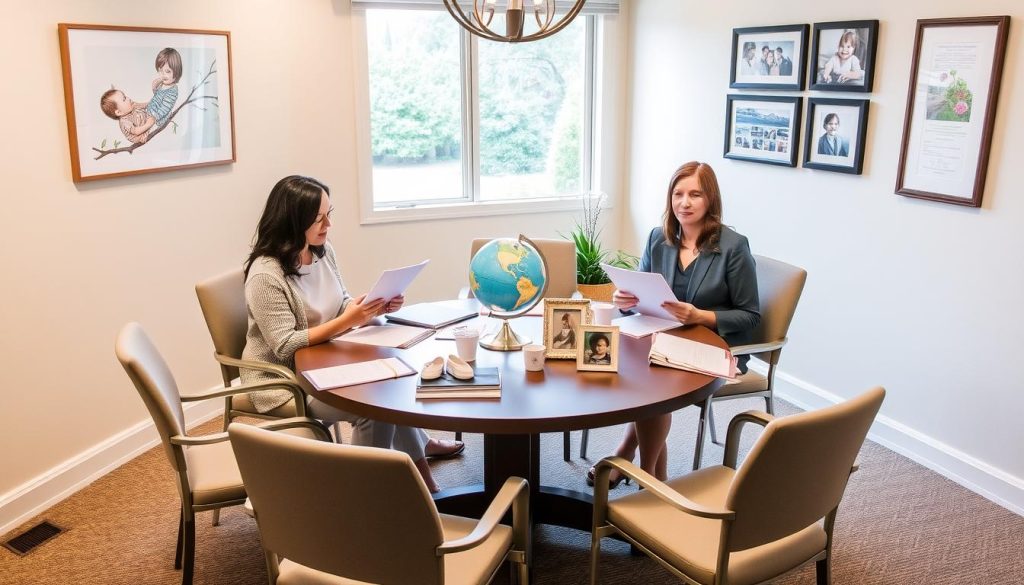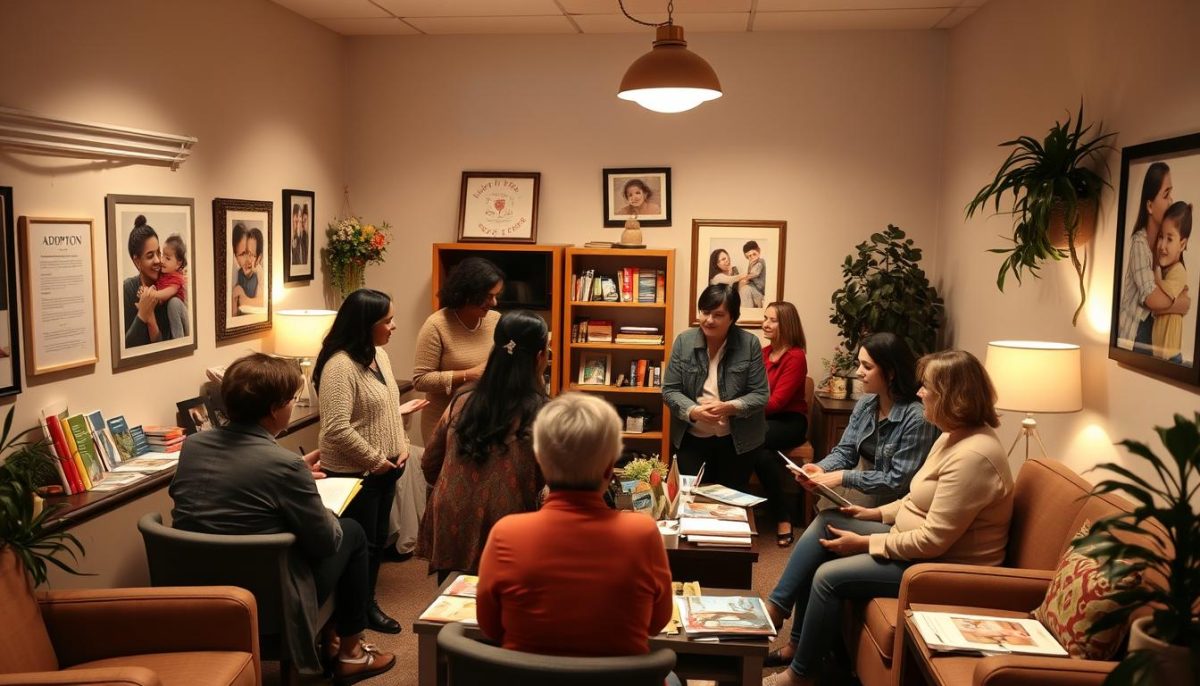Finding the right adoption agency is key to a successful adoption. With over 30 years of experience, these agencies do more than just help you adopt. They guide you from the start to after the adoption.
When picking an agency, look at what they offer, where they are, and what others say about them. Reviews and testimonials can help you make a good choice.
The adoption journey has its ups and downs. It’s important to choose an agency that fits your needs and goals. Whether you’re looking at national, local, or international agencies, knowing what each offers is crucial.
The best agencies are clear, open, and professional. They make the journey to growing your family easier.
Key Takeaways
- The right adoption agency is crucial for a smooth adoption process.
- Consider the agency’s types of adoption, geographic reach, and reputation.
- Transparency, clarity, and professionalism are key attributes to look for.
- National adoption agencies typically have shorter wait times.
- International adoption agencies must be Hague-accredited.
Understanding Adoption and Foster Care
Exploring adoption and foster care is key for those thinking about becoming adoptive parents. It’s important to grasp these systems well to make informed choices.
What is Adoption?
Adoption is a legal act where the rights of the biological parents are given to the adoptive parents. It forms a new, lasting family for children. In the U.S., about 125,000 kids wait for adoption each year.
The cost of adoption varies a lot, from $0 to $40,000. This depends on whether it’s domestic, international, or foster care adoption. About 60% of kids adopted from foster care stay in touch with their biological families.
What is Foster Care?
Foster care is a temporary setup where kids live with state care due to their parents’ inability to care for them. Over 400,000 kids are in foster care yearly. It aims to give them a safe place until they can be adopted or go back home.
Foster care adoption costs are generally lower, from $0 to $2,500. Almost 30% of foster kids have three or more placements before being adopted. Foster families get monthly support to help with the child’s needs.
Differences Between Adoption and Foster Care
The main difference is permanence. Adoption is meant to be forever, creating a lifelong family bond. Foster care, however, is temporary, aiming for reunification or adoption.
When comparing foster care vs adoption, consider the permanence and the need for emotional readiness and long-term commitment.
| Aspect | Adoption | Foster Care |
|---|---|---|
| Permanence | Permanent | Temporary |
| Cost | $0 – $40,000 | $0 – $2,500 |
| Eligibility | Few Restrictions | State-Specific Requirements |
| Biological Family Contact | 60% Maintain Contact | Varies Widely |
| Monthly Stipend | Rare | Common |
Types of Adoption Agencies
When you think about adoption, knowing the different types of agencies is key. Each one meets different needs and offers unique services. This can greatly affect your adoption journey.
Private vs. Public Agencies
Private adoption agencies are funded by private groups. They often give more personalized help. They provide detailed support, like access to birth parents’ social and medical history. This lets adoptive families have more contact with birth parents. For example, private adoptions in Tennessee usually cost between $12,000 to $18,000, sometimes more for wealthier families.
Public adoption services, on the other hand, are run by the state. They might have fewer resources but focus on children in foster care. In Tennessee, the Department of Children’s Services (DCS) mainly places sibling groups or older kids. These children often face trauma, disrupted bonds, and parental drug abuse.
Nonprofit vs. For-Profit Agencies
Nonprofit agencies use their earnings to improve their services and help both adoptive and birth families. Many well-known nonprofit agencies in the U.S. offer counseling and require adoption classes. This ensures both sides get the support they need during the adoption process.
For-profit agencies, however, aim to make money. They might offer similar services but focus more on profit. They might match families faster but charge higher fees and prioritize making money.
International Adoption Agencies
International adoption agencies focus on placing children from other countries. They deal with complex legal systems and ensure ethical practices. These agencies must be Hague-accredited, showing they protect children and follow ethical adoption rules.
But, international adoption has its own challenges. It involves country-specific rules and higher costs. Some countries have reduced or stopped international adoptions due to complex procedures and compliance issues.

Choosing the right agency depends on your situation and what you want from the adoption process. Whether you prefer private agencies for personal service, public services for accessibility, or international adoption, do your research. Pick the agency that best fits your family’s needs.
Key Considerations for Choosing an Agency
Choosing the right agency is key when starting your adoption journey. Look at factors like licensing, what they specialize in, and where they operate. This helps find the best fit for your needs.
Licensing and Accreditation
Licensing and accreditation are vital in the adoption legal process. They ensure agencies follow the law and professional standards. Working with accredited adoption agencies means you’re protected ethically and legally. Check an agency’s reputation with the Better Business Bureau to avoid issues.
Specialization Areas
Adoption agencies specialize in different areas. This could be transracial adoptions, LGBTQ+ families, or older child adoptions. Knowing these adoption specializations helps find an agency that meets your needs.
Geographic Reach
The area an agency covers affects your adoption journey. Local, national, or international agencies change the adoption legal process and support. For example, private adoptions take about 12 months, while state adoptions can take from right away to five years.
| Criteria | Details |
|---|---|
| Private Adoption | Average wait time: 12 months |
| State Adoption | Wait time: Immediate to 5 years |
| Accredited Adoption Agencies | Ensure ethical and professional standards |
| Adoption Specializations | Transracial, LGBTQ+, older child adoptions |
| Geographic Reach | Local, national, international |
Evaluating Agency Services
When looking at adoption agencies, it’s key to check their services. They should help with suitability checks, legal steps, and ongoing support. This ensures a smooth adoption journey for everyone involved.
Home Studies and Support
The home study is a crucial part of adoption. It checks if your family is ready to adopt. This includes background checks, interviews, and home visits.
These studies help understand your family’s readiness. They also offer educational tools to prepare you for the adoption journey.
Legal Assistance and Guidance
Adoption has many legal steps. Getting legal help is essential to follow the law. Agencies often provide or suggest legal services.
This ensures the adoption is legal and avoids future problems. It helps you understand contracts, parental rights, and court procedures.

Post-Adoption Services
After adoption, support is vital. Agencies offer counseling, support groups, and resources. This helps the child and family adjust well.
Good post-adoption services lead to a stable and happy family. They help with emotional and psychological needs, ensuring a strong family bond.
| Service | Key Features | Benefits |
|---|---|---|
| Home Studies | Background checks, home evaluations, interviews | Assesses family suitability and prepares for adoption |
| Legal Assistance | Contracts, court hearings, legal documents | Ensures compliance with laws, mitigates risks |
| Post-Adoption Support | Counseling, support groups, resources | Facilitates smooth integration and addresses potential issues |
Researching Agency Reputation
When thinking about adoption, it’s key to look into the reputation of different agencies. Hearing from others who have adopted can give you important insights.
Reading Reviews and Testimonials
Even though only 5 percent of people write reviews, they can still give a peek into an agency’s work. Big national agencies might have few reviews on sites like Google. This is because adoption is a personal and private matter, making it hard to get a full view from reviews.
Also, be careful of fake reviews in this field. It’s smart to look at online feedback but also use other ways to check an agency’s reputation.
Checking References
Checking references is a good way to judge an adoption agency. Talking or meeting families who have adopted through the agency can give you real insights. Ask them about the agency’s professionalism, how clear they are about fees, and their support after adoption.
Remember, while reviews can help, talking to people directly is usually more reliable and detailed.
Engaging with Support Groups
Joining adoption support groups is also very helpful. These groups, online or offline, connect you with other adoptive parents. They share their experiences and insights, giving you a wider view.
Being part of these communities helps you see what’s good and what’s not about different agencies. This way, you can make a better choice.
Questions to Ask Potential Agencies
Choosing the right adoption agency is key. You need to ask the right questions to find one that fits your needs. Knowing about the adoption process, costs, and timelines is crucial. Here are important areas to cover when talking to agencies:
About Their Adoption Process
Understanding the adoption process is vital. It helps you know what to expect and prepare well. Ask about:
- The steps from application to final placement.
- How long the home-study takes and what it includes.
- Communication policies, like response times.
- Post-adoption support, like groups and financial help.
- Training class schedules, including evenings and weekends.

About Fees and Expenses
Adoption costs are a big factor. You should know all about fees and expenses to avoid surprises. Ask about:
- The total cost and what it includes.
- If any costs are tax deductible.
- Financial aid or grants for families.
- Differences in costs between public and private agencies.
- Financial help for activities for adopted kids.
About Timelines and Placements
Adoption timelines vary. Knowing this helps you plan better. Ask about:
- The average time from application to adoption.
- Recent placements and child ages.
- Experience with different family types, like military families.
- Out-of-state adoption policies and timelines.
- Respite care and transportation options.
By asking these questions, you can find an agency that meets your needs. Good planning and research lead to a successful adoption journey.
Understanding Agency Policies
When you’re exploring adoption, knowing the agency’s policies is key. It’s important to look at how they share information, handle birth parent relationships, and keep things private.
Transparency in Communication
How open an agency is matters a lot. Good communication builds trust and makes you feel more at ease. They should be clear about the adoption steps, any hurdles, and costs.
Policies on Birth Parent Relationships
Adoption policies on birth parent ties differ a lot. Whether it’s open or closed adoption affects these relationships. Open adoption can mean setting boundaries and building a connection with birth parents. Knowing the agency’s approach is crucial for understanding post-adoption life.
Confidentiality and Privacy Practices
Keeping things private is a big deal in adoption. It’s important the agency has strong privacy rules. They should protect everyone’s personal info well, making you feel safe and secure.
| Policy Area | Key Considerations | Impact on Adoption Process |
|---|---|---|
| Agency Transparency | Clear communication on process, fees, and challenges | Builds trust and reduces uncertainty |
| Birth Parent Relationships | Open vs. closed adoption policies | Defines post-adoption relationships and contact |
| Adoption Privacy | Maintenance of confidentiality and secure data handling | Ensures comfort and security for all parties |
Making Your Final Decision
Deciding to adopt is a big and emotional choice. It requires careful thought and research. Now, it’s time to trust your instincts about what’s best for you and your family.
Trust Your Instincts
At this point, trust your gut. While facts and reviews are important, your comfort with an agency matters too. Your instincts, shaped by your journey, will help you choose wisely.
Seeking Additional Input
Talk to those who have adopted before. Advice from experienced parents or counselors can help. They share their experiences and offer practical tips for your decision.
Preparing for the Journey Ahead
Choosing an agency is just the start. You need to understand the whole adoption journey. This includes getting your home ready and knowing about post-adoption support.
Think about your child’s future too. Plan for their education and community involvement. This will help them settle in smoothly.
Preparation is not just about planning. It’s also about being emotionally ready. Support groups and counseling can help with the emotional ups and downs. Remember, adoption is a journey filled with challenges and joys.
